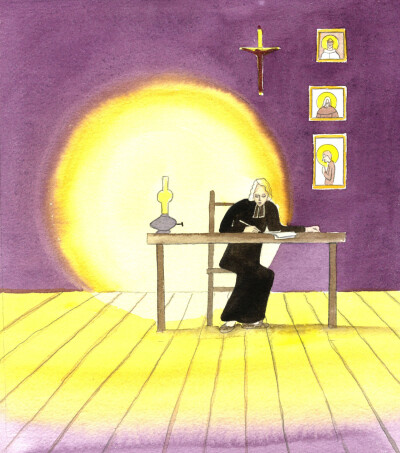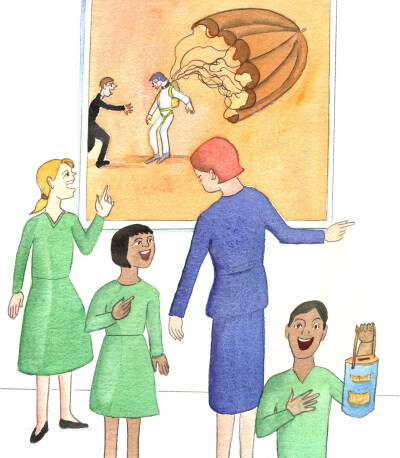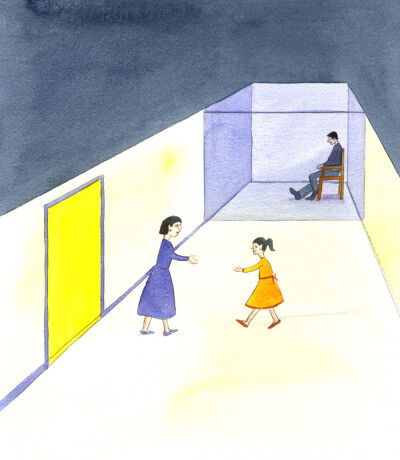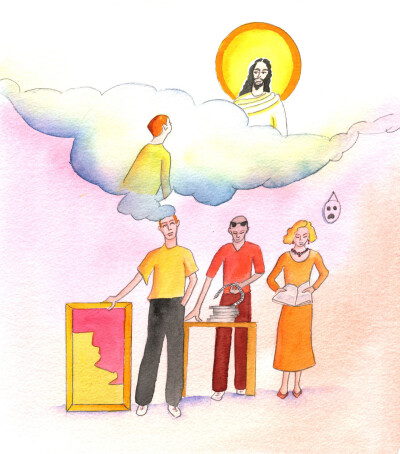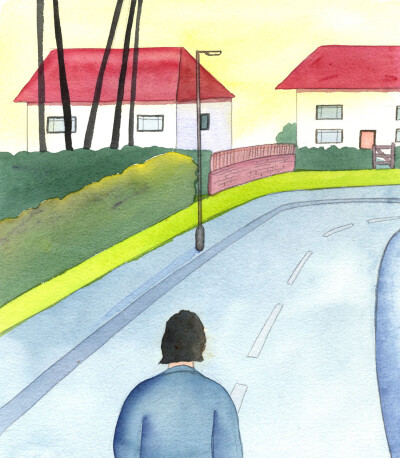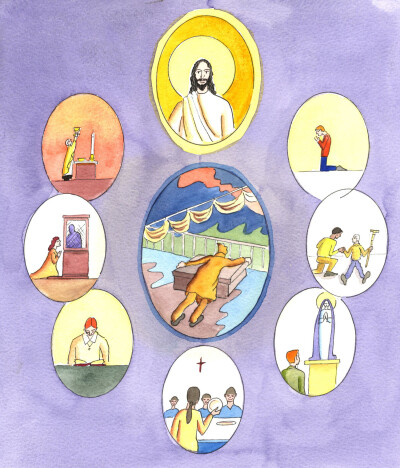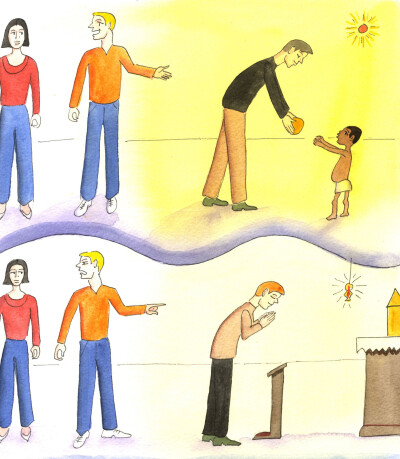Search Page
Showing 81 - 100 of 101
People who love Christ never love Him with a selfish love, but always want others to know Him too. It's as if the journey to Heaven goes through a bright corridor, in which fervent people frequently look back, to make sure that the people they love are following the same way. If not, they help them by their loving intercessions.
Good priests live as if in a radiant light, the light of grace, because of their love for Christ, which is shown out in love for the flocks they teach and cherish. Bad priests are like those areas in space called black holes, which emit no light, but draw in what is good, and destroy it.
Our loving Father in Heaven invites us to share our lives with Him. We can be confident that He is just, kind and merciful, just like Jesus His Son; yet we are often afraid to show Him what our lives are really like. What do we try to keep secret from Him? What dark areas do we hide? Are we really sincere, as we say we are doing His Will and loving Him and our neighbour?
St. John Vianney was not a great scholar, but he loved God with all his heart, and so did all he could to write interesting and powerful homilies in order to lead people to repentance, new life, and sincere love for Christ, and for their neighbour.
It is unfortunate that many Catholic school-children are led to practice acts of charity which always attract attention, draw applause, make those acting feel virtuous. Where are the instructions to engage in works of charity, simply for the love of God: to do good, and develop humility?
If we have faith in Christ, and a fervent spiritual life, we can become like the healthy mustard-plant that Christ described, in which 'the birds of the air can rest'; but if we have very little faith in Him, and are full of self-pity about our difficulties, resentful of the crosses we carry, and prickly towards our neighbour, we are like a thorn bush amidst all the beauty and life that is seen around us.
The problem at the heart of many modern tragedies is that a person refuses to love his neighbour. This is true, whether soldiers burn the crops of terrified people, or healthy people treat the sick as a nuisance, or someone sets out with deliberate plans to make a person miserable. People who do such things ignore God's wishes. We need to examine our true intentions.
When we talk about the Magisterium we mean that it is Christ Who has given us the Pope and the other Catholic Bishops, to teach us the truth handed on in Sacred Scripture and in the Sacred Tradition. They teach us right from wrong. To spend a life-time arguing about their sure teaching is to waste valuable time, which we could have spent striving for holiness in the service of God and neighbour.
If we treat our fellow-creatures with contempt or hard-heartedness, we cannot draw down graces from Heaven by our special devotions to Our Blessed Lady, no matter what efforts we put into our devotions. We cannot please Our Mother whilst blithely disobeying the advice, and the Commandments, of her beloved Son.
It is possible for us to persevere in naked faith, serving God and our neighbour with love, aiming for sanctity, hoping for Heaven, even when it seems as if we have no evidence of support, no signs that we are on the right path. Naked faith means clinging to what we believe to be good, and doing good, by the strength given to us by Christ and His Church.
What counts above all, in our lives, is love: love for God, and for our neighbour for God's sake. As God the Father looks down from Heaven, it's as if He sees a light shining wherever a person lives to do the Will of God, which means to believe in Him and His Son, Jesus Christ, and to follow His Way. Whatever such a person does is pleasing to God, if it is not sinful; so, although that person is called to do one task not another, he should not be anxious as he tries to discern precisely what to do next. He gives joy to God by living in a state of grace.
When healthy people feel trapped in doubt, gloom or lack of hope, they might hide away in darkness, doing only the minimum of ordinary duties, and generally inactive and unsociable. The life of a Christian inevitably stagnates or decays if it is not regularly employed in the praise of God, and acts of love towards others.
Artists, film-makers and actors, and others, are all people who easily become obsessed with their work; yet when each one dies, the question they will want to answer will not be about their art, or any of their work, in itself, such as 'Have I fulfilled my ambitions?' - but, rather, 'Have I loved God and my neighbour, and fulfilled God's plan for my life?'
God our Father loves us. He hears us, every time we pray. As we 'hold up' before the Father, in the name of Christ, people who are dear to us, and people who are sick, bereaved, or suffering temptation or other trials, it's as if we are strolling round our neighbourhood, asking the Father to grant His peace, strength and joy first to one person then to another; and our prayers are worthwhile, whether or not we notice visible results.
Just as sailors at sea know how to 'batten down the hatches' and survive in a storm, because of some basic duties and basic wisdom, so must we hold fast to some Catholic 'basics' that will help us to remain faithful in all the storms of life. We need to know and love Christ, to turn to Him in prayer and in the Sacraments, especially the Holy Sacrifice of the Mass, and Confession. If we study the Scriptures, and ask for the prayers of the Saints and Angels, and show love to our families and to the poor, we do well.
Christ asks all the members of His Church to love one another with a holy love. If we cannot do that, He asks, how can we possibly act with authentic, holy love towards people outside the Church, many of whom oppose our teachings, our plans, and our participation in the life of our community or country?
Christ looks on with gladness when we keep His Commandments, out of love for Him; but it is a cause for sadness, in His sight, that many Catholics praise people who are fervent in obeying the second Great Commandment about love for neighbour, but are scornful about people who are fervent about the First Great Commandment, and who are concerned for the honour of God, the dignity of Catholic worship, and the faithful handing-on of revealed Truth. Those are even called fundamentalists!
We are not expected to be imprudent or foolish; yet Christ delights in seeing people treat one another with respect, with displays of sincere kindness towards everyone, whether employers or employees, older people or young, in imitation of Christ, Who loves everyone.
We need to remember the Commandments: above all, about loving God, but also about loving our neighbour. Some people imagine it is no great wrong, to steal private property, but it can be as bad as physically assaulting the innocent, since it causes emotional damage and leaves people very afraid, even for years. Every thief should think about his likelihood of being saved.
How to Pray: Stages of the Spiritual Life
This text is published as Chapters 7 and 8 of How to Pray (Part One: Foundations). An introduction to the life of prayer with much practical advice about how to deepen your prayer life.
7 ABOUT TH…
Showing 81 - 100 of 101




